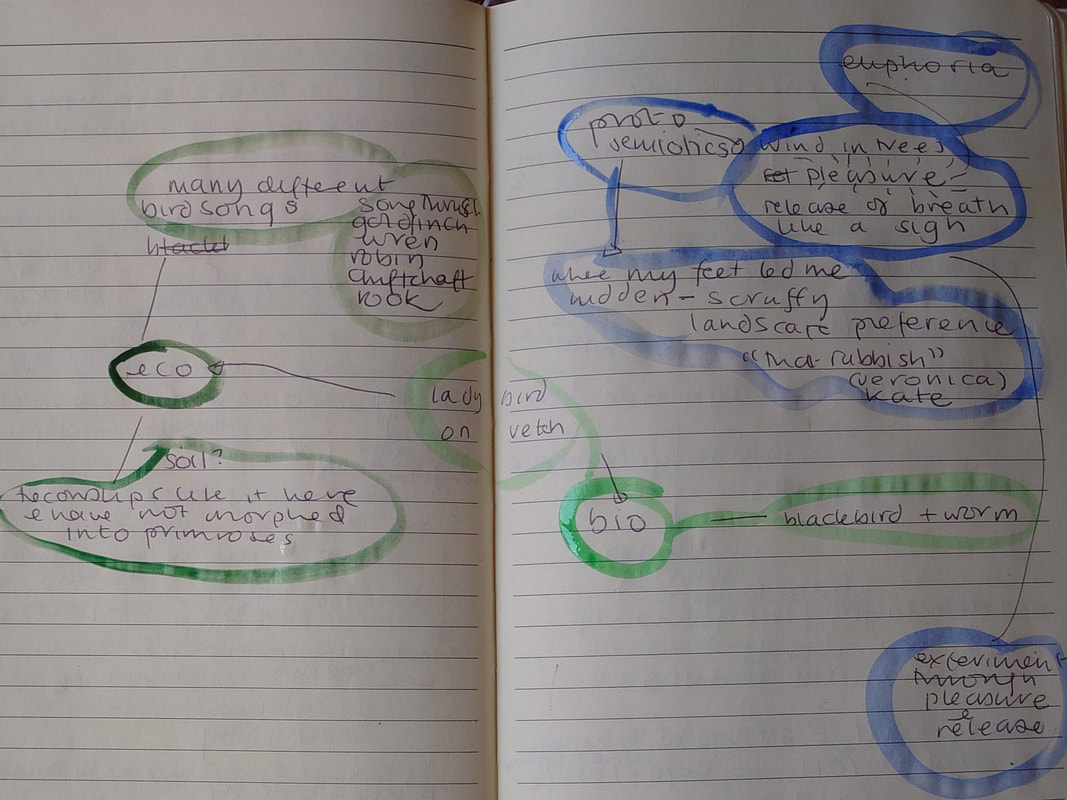CommunE-ication, Semiotics, language, validityEmbodied ecology is commune-ication. We 'become with' (Harroway, 2016) rather than simply observe, conscious of who we are, who they are and where we are: an empathic, 'kin-centric' relationship. We delight in side-along play with the rest of life.
'From the point of view of the thing.' (Lecture by Dr Pavel Cenkl, Ship Studio, Dartington Hall, May 2023) A tick knows: acid, heat, light. Each living thing has her own sensory system and therefore her own umwelt, partly her own sensory apparatus and partly her encounters and entanglement with other life and the more-than- human. MOVEMENT AS COMMUNE-ICATION Mimicking is the first stage of learning a language or learning to dance. Performing with Oogly Boogly, we mirrored the movement of babies between six and eighteen months, a game they delighted in, an empathic communication. Asking Dr Alex Jordan whether scientists had used ‘mirroring’ the movements of a non-human as a form of communication, he said that if something moves like a fish,the fish will respond to it as fish even if it doesn’t look like a fish. Words matterO'Gorman talks of a story as a tool to see things in a particular way, (O'Gorman, 2018), Abram of 'soundspell' and how words shape thoughts. (Abram, 1997)
Abram's descriptions are too close to my bone. I am porous and need to safeguard my own ecological self. At Sirona Horse Therapy, I had a shiver of recognition as Kate Ford spoke of how horses notice you long before you notice them, and need a lot of space around them. I am horse! Though we are predators we have also been prey. Some neurodiverse conditions entail a heightened sensing.
As a linguist, I know learning a language changes the learner. In the film 'Arrival,' (Villeneuve 2016) a linguist learns the language of a cephalopod-like otherworld more-than-human. I think of O'Gorman's jellyfish and Harroway's 'tentacular!'
Do other languages have better words to describe 'ongoingness'? The modal particle '了' in Chinese indicates change. VALIDITYI fear my words won't land: a pain point, information. Sam Alty's voice ecology workshop: you 'sound' your ancesters, the world speaks through you, a 'we' not an 'I', therefore less scary.
SEMIOTICS: 'To the things themselves'Bio-, eco-, proto-semiotics, can you ever get to ‘the thing,’ 'the experiential moment when one forgets what one is?' (Lecture by Dr Pavel Cenkl, Ship Studio, Dartington Hall, May 2023) I approach this by walking, 'the intentional act closest to the unwilled rhythms of the body...' (Solnit,2017)
How to minimise the distance between representation and ‘the thing’ is something I have been feeling towards for years. Stephanie: writing does not get her further but photography and filmmaking do. Veronica: a painter friend tells himself to call the tree a cake, so as not to draw what he expects a tree to be. EXERCISEReferencesAbram, David "The Spell of the Sensuous: Perception and Language in a More-Than-Human World, Vintage (edition 1st), 1997 O’Gorman, Róisín . “Can Your Jellyfish Sing? ‘Tentacular’ Moves From Individual Embodiment to the Planetary.” Global Performance Studies, vol. 2, no. 1, 2018 Solnit,Rebecca "A Field Guide to Getting Lost" Canongate Canons, (edition 1st) 2017 Villeneuve,Denis(Director) Heisserer, Eric and Chiang,Ted (Writers), 2016 "Arrival," Paramount |
